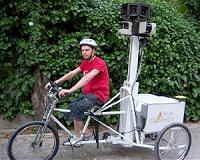 |
London (AFP) Nov 3, 2010 Google committed a "signficant breach" of British law when its Street View cars grabbed personal data but the Internet giant will not be fined, the country's information commissoner said Wednesday. Britain is the latest in a series of countries to condemn Google after the cars, which take photos for the search engine's free online mapping service, mistakenly picked up private emails and passwords from wireless networks. Information Commissioner Christopher Graham said Google's British arm will now be subjected to an audit but it will escape a fine so long as the firm vows not to commit similar privacy breaches in future. "It is my view that the collection of this information was not fair or lawful and constitutes a significant breach of the first principle of the Data Protection Act," Graham said in a statement. He said an investigation by the independent authority found Google's Street View cars had collected "fragments of personal data" from wireless networks which it had now been ordered to delete. "Google UK will be subject to an audit and must sign an undertaking to ensure data protection breaches do not occur again or they will face enforcement action." The statement said Graham had rejected calls to fine Google over the breaches "but is well placed to take further regulatory action if the undertaking is not fully complied with." Google apologised for collecting the data and said it was working with British authorities to ensure that it did not happen again. It first revealed the problem in May. "We are profoundly sorry for mistakenly collecting payload data in the UK from unencrypted wireless networks," Peter Fleischer, Google's global privacy counsel, said in a statement. "As we have said before, we did not want this data, have never used any of it in our products or services, and have sought to delete it as quickly as possible." But Big Brother Watch, a British pressure group that fights invasion of privacy, said it was "disgraceful" that the watchdog had not fined Google. "If Google can harvest the personal information of thousands of people and get off scot-free, then the (information commissioner) plainly has a contempt for privacy," the group's director Alex Deane said in a statement. The Californian company has faced strong resistance in some countries to Street View -- which enables Internet users to obtain a virtual image of a whole street from every angle -- due to concerns over invasion of privacy. Italian prosecutors said last week they had launched an investigation against Google. Spain filed suit against the firm earlier in October while in September Czech authorities banned Google from collecting Street View data. The US Federal Trade Commission said last week that it was ending its inquiry into Street View, although Google is facing civil suits in several US states demanding millions of dollars in damages.
earlier related report Street View users were able to see the rolling hills, tree-lined streets and quaint wooden houses of the tiny town of Oberstaufen in Bavaria, south Germany. In contrast to the fevered debate leading up to the service's launch, the town, which relies heavily on tourism, welcomed its introduction, even baking a cake to mark the arrival. "For tourists, it can only be an advantage if they can already get detailed information about their holiday on the Internet before they book," said Andrea Presser, from the town's tourism office. Street View, available in around 20 countries, allows users to "walk" through towns and cities using photos taken by specially-equipped vehicles. But it ran into fierce opposition in Germany, both from privacy campaigners and some politicians. Although Germans are avid users of Street View images from other countries, the planned roll-out here caused alarm in a country particularly sensitive to privacy concerns due to the gross abuses under the Nazi and communist regimes. As a special concession to these concerns, Google allowed people to "opt out" of the service, promising to pixelate their house. The firm announced on October 21 that nearly a quarter of a million Germans had done this. Some houses in Oberstaufen were indeed blurred. Google plans to roll out the service for Germany's 20 largest cities later this year, including Berlin, Frankfurt, Munich and Hamburg. The US firm also offered used a "little tour of Germany" taking in six important sites in the country, including the office of Chancellor Angela Merkel in Berlin and football team Bayern Munich's stadium.
Share This Article With Planet Earth
Related Links Earth Observation News - Suppiliers, Technology and Application
 After bitter row, Google launches Street View in Germany
After bitter row, Google launches Street View in GermanyBerlin (AFP) Nov 2, 2010 Following months of controversy over privacy, US Internet giant Google put its first images from Germany online Tuesday as part of its Street View navigation service. Street View users were able to see the rolling hills, tree-lined streets and quaint wooden houses of the tiny town of Oberstaufen in Bavaria, south Germany. In contrast to the fevered debate leading up to the service's laun ... read more |
|
| The content herein, unless otherwise known to be public domain, are Copyright 1995-2010 - SpaceDaily. AFP and UPI Wire Stories are copyright Agence France-Presse and United Press International. ESA Portal Reports are copyright European Space Agency. All NASA sourced material is public domain. Additional copyrights may apply in whole or part to other bona fide parties. Advertising does not imply endorsement,agreement or approval of any opinions, statements or information provided by SpaceDaily on any Web page published or hosted by SpaceDaily. Privacy Statement |